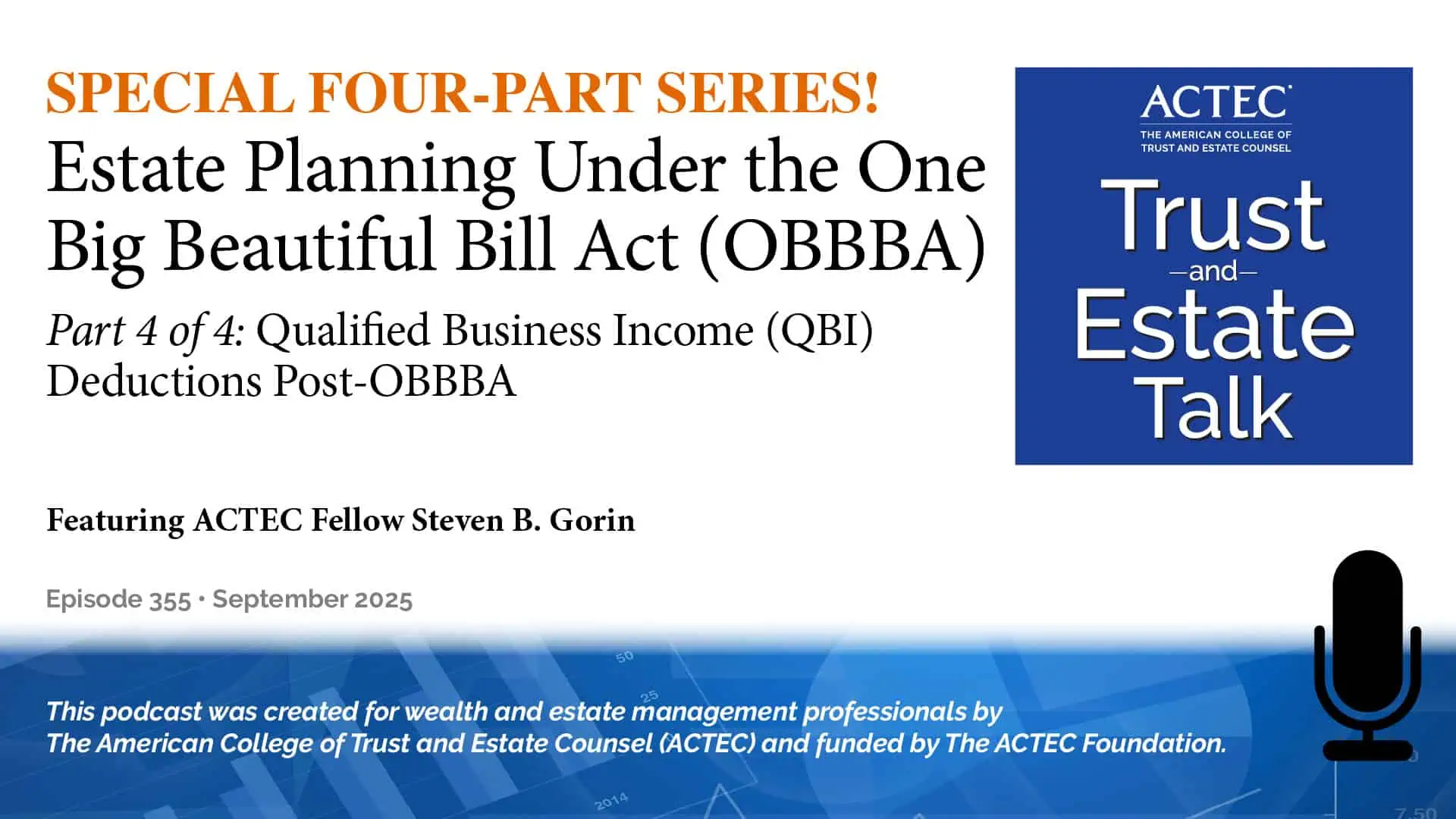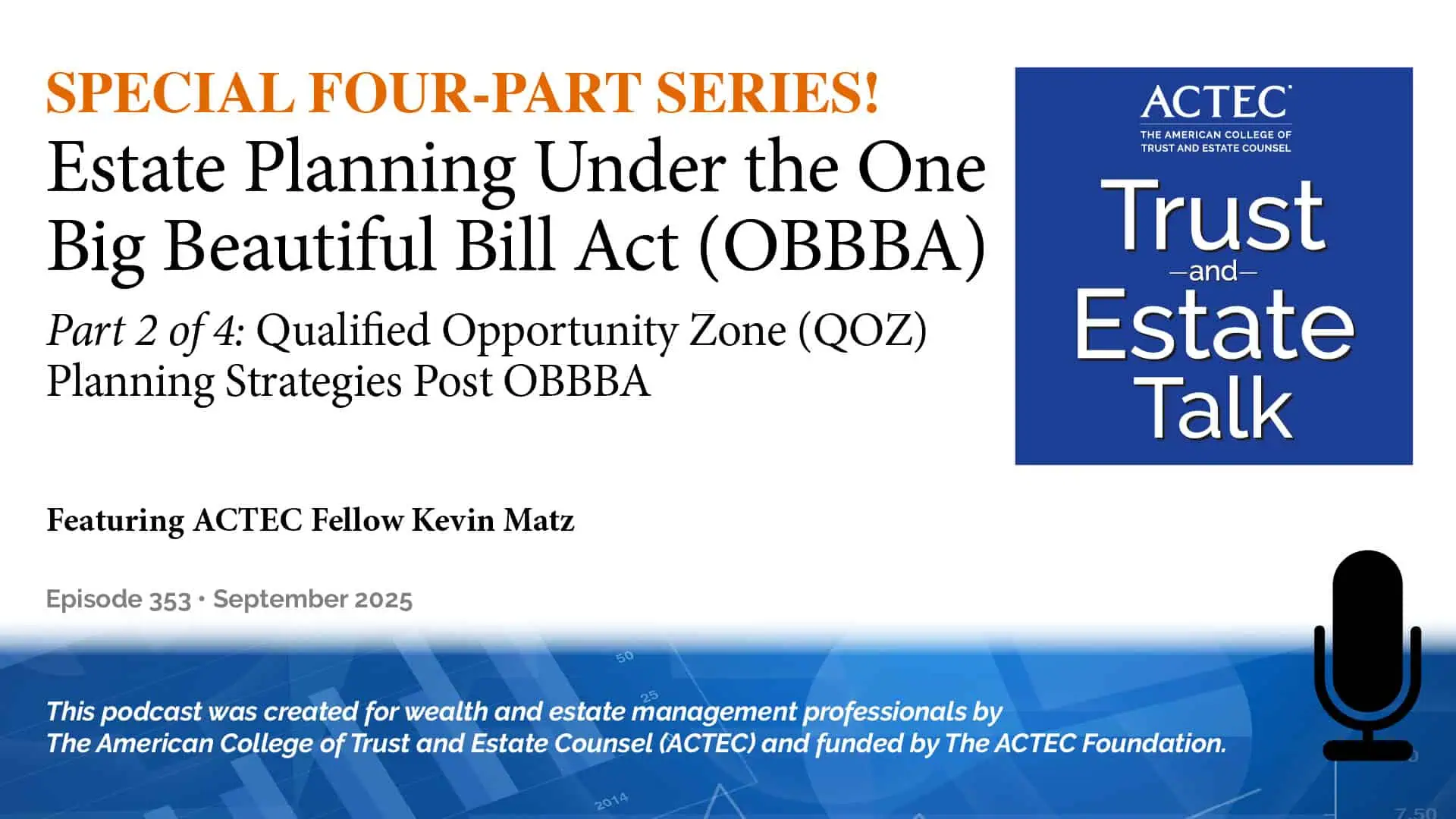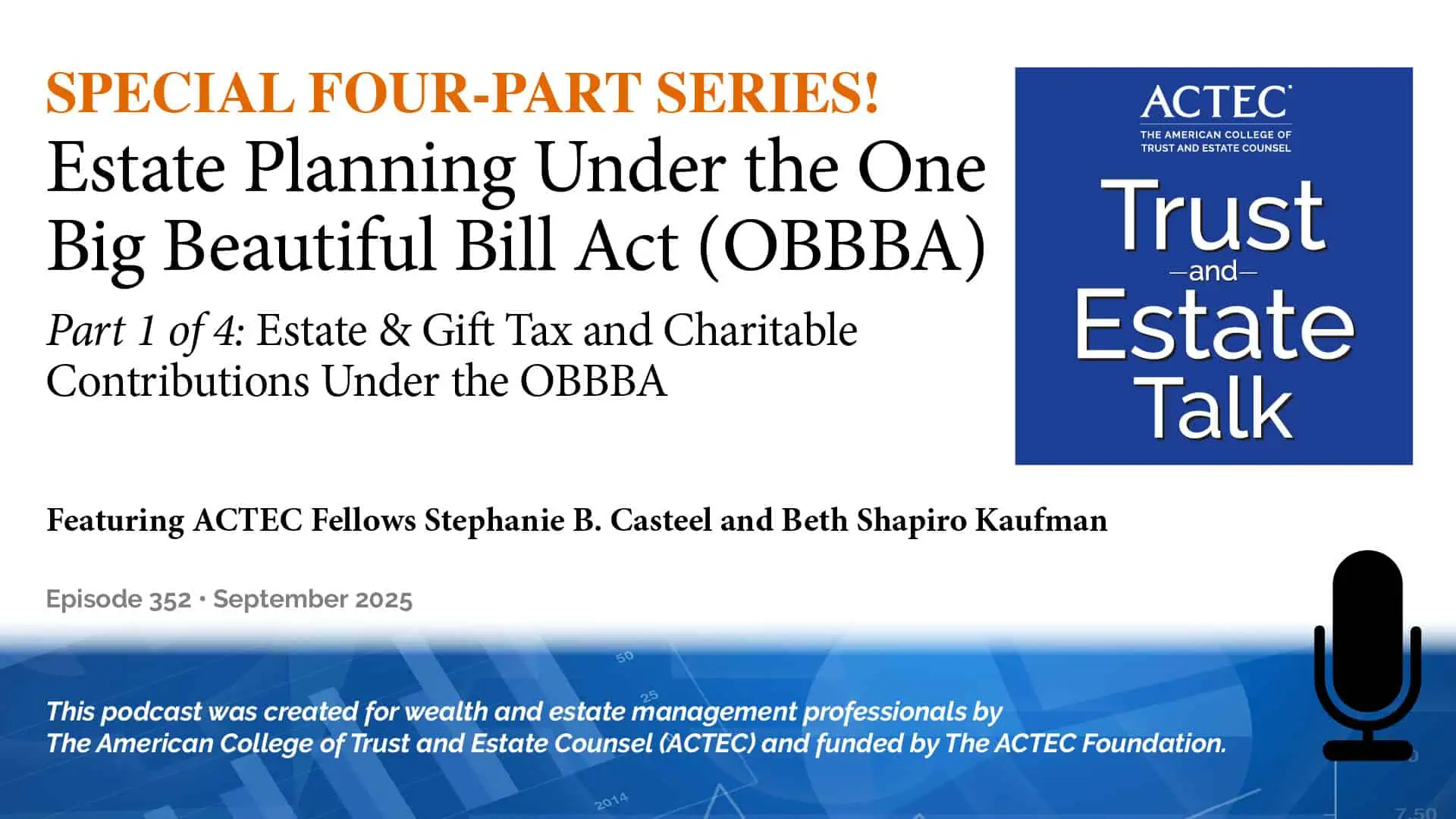FTC’s Ban on Noncompete Agreements
“The FTC’s Ban on Noncompete Agreements,” that’s the subject of today’s ACTEC Trust and Estate Talk.
Transcript/Show Notes
This is Travis Hayes, ACTEC Fellow from Naples, Florida.
On April 23rd, 2024, the Federal Trade Commission (FTC) issued a final ruling regarding noncompete agreements. FTC Chair Lena Kahn stated, “Noncompete clauses keep wages low, suppress new ideas, and rob the American economy of dynamism, including from the more than 8,500 new startups that would be created a year once noncompetes are banned. The FTC’s final rule to ban noncompetes will ensure Americans have the freedom to pursue a new job, start a new business, or bring a new idea to market.”
We are joined today by ACTEC Fellow Jill Beier from Lake Placid, New York, to discuss the FTC’s ruling and share recommendations for law firms on this important and timely topic.
Jill, how does the FTC’s ban on noncompete agreements impact our clients in the practice of trust and estates?
Overview of the FTC Ban on Noncompete
Jill Beier: Well, thank you for having me, Travis. I’m happy to talk about this topic. As you’ve said in the intro, the FTC views noncompete agreements as anti-competitive. They have banned the use of noncompetes by almost all employers for almost all workers. And that’s workers that have been paid or unpaid, whether they’re an independent contractor or an employee. And there are very few exceptions to this rule.
Impact of FTC Noncompete on Trust and Estate Field
As you said, the rule takes effect on September 4th, 2024, and employers have to give notice to all current and former workers of the fact that this ban is being put in place. It impacts us in the trust and estate world in several ways. Many small, closely held and family businesses that we advise are able to protect themselves by putting in place a noncompete. Those noncompetes ensure that the resources they invest in their employees- through training, providing skills- that those resources aren’t wasted by those key employees walking out the door, taking all that training and all those skills with them. Noncompetes are also used to protect intellectual property that’s developed in the company as well as trade secrets. So without noncompete agreements, our clients are not able to protect themselves as well as they otherwise would be able to.
Succession Planning
Another area that we get involved in as practitioners is succession planning for our small and family-held businesses. Noncompetes are often used to ensure that non-family key employees remain at the business to assist with transition to the next generation of family members. Again, without the use of that noncompete, that succession planning becomes more challenging.
Business Valuation
Probably one of the bigger areas in a topic of a lot of discussion is in the valuation of businesses. Obviously, valuation is a key component of many estate plans that we work on for our clients. And without the use of a noncompete to protect that intellectual property and those trade secrets, as I was just talking about, the loss of that property because employees are leaving the business can result in a reduced value of the business.
Also, if we have employees, a constant flow of employees, leaving the business and we’re having to hire new employees and invest those resources to train new employees, that increase in cost and hiring costs also can lead to a reduction in the value of our business. So it really impacts our area in several ways and we need to be mindful as we advise our clients going forward.
Travis Hayes: Jill, are there any exceptions to the ban on noncompetes?
Jill Beier: There are actually, Travis, there are about five exceptions that are enumerated in the rule.
Exceptions of Noncompete
Senior Executive
There is an exception for something called a senior executive. And there’s a special definition in the rule, it’s a two-prong definition. There is an annual compensation requirement of at least $151,164 a year. And that’s any kind of compensation, non-discretionary bonuses, non-discretionary and salary commissions, that sort of thing. That’s the first prong.
And then the second prong is that the worker must be in a policymaking position. So it’s a high level position making policy for the entire business enterprise. And if there’s a worker of the company that fits that definition of a senior executive and that senior executive is subject to a noncompete agreement prior to the effective date of September 4th, 2024, then that noncompete agreement will be an exception to this ban.
Business Sale of Person’s Interest
Also, if there is a noncompete that is created in conjunction with a sale of a person’s interest in a business entity or with a sale of substantial amount of the assets of the business entity, that noncompete will be an exception to this ban.
Existing Cause of Action
The third one is if there is an existing cause of action for a current noncompete agreement, this ruling by the FTC will not obviate any litigation that has already commenced as a result of a current noncompete agreement. In the franchisee-franchisor context, franchisees are often asked to sign a noncompete agreement in exchange for having the ability to use all of the resources of that franchisor and that relationship, that noncompete in connection with that relationship will be an exception.
Good Faith Belief
And then finally, we have a catchall exception that if the employer has a good faith belief that the rule is not applicable to them, then any noncompetes they have in place will be an exception to the ban. So those are the five exceptions to the ban.
Travis Hayes: What should clients do to ensure they’re in compliance with the new regulation? And, as a follow-up, are there any planning opportunities that we should be thinking about?
Steps Businesses Should Take to Address Noncompete Agreements
Jill Beier: Great question. So keep in mind that there are civil fines and penalties for non-compliance, and those add up to about $50,000 a day. So this is a pretty expensive proposition for a company to decide they’re not going to comply with these rules.
Identify Senior Executives
But I think first thing a company should do is identify those workers that fall into that senior executive category that have current noncompete agreements and just wipe those to the side. All of those are going to be exempt from the ban, so identifying those is key.
Also to keep in mind, noncompete is defined very broadly in the rule. So it’s defined as any term or condition of employment that functions to prevent a worker from seeking or accepting work after they leave employment or from starting a new business after they leave employment if it competes with the current employer. It doesn’t have to be a contractual term that’s written, it can be just a workplace policy. I think it’s really important for our clients to review not only current employment agreements that may have language that function in this way, but also current confidentiality agreements or NDAs, non-solicitation agreements, deferred compensation plans, shareholder agreements, and even employee handbooks that in them may have clauses that are drafted so broadly that they effectively function as a way to prevent workers from seeking employment or starting a business after they leave employment there.
Review Current Language and Update NDAs
I think other things that our clients need to think about is to determine what language they’re going to use to satisfy this notice requirement. In the rule, there is some safe harbor language; it’s very broad and that can be used the company where they can develop their own language as long as they notify those former and current employees that any current noncompete is not legally enforceable and will not be enforced against the worker. That’s the main message that needs to be conveyed.
Notify Employees
Also, the method of communicating that notice, it can be done in a number of ways, be it a hard copy or electronically. The FTC has said that a mass email communication would satisfy the notice requirement. So that might be the easiest way to accomplish and satisfy the notice requirement. And then also the timing. The deadline for the notice is September 4th, 2024. Most companies that I’ve spoken with are going to wait until the very last minute to make this notice requirement, mainly because the legal landscape is still changing a bit in this area and so I think it’s probably prudent to wait a little bit before you give that notice.
Planning opportunities you asked me about, I think there are several here. I think one thing that employers can do- so we talked about the definition of a senior executive and any of those individuals that are under a noncompete are exempt- so one thing, one planning opportunity may be to look at your workers and see if there’s a way you can add compensation to satisfy the annual compensation prong of that senior executive definition and/or add responsibilities to elevate that worker to the senior executive status. And if they aren’t under a current noncompete, then implement a noncompete so that you can keep that worker in the exempt from the banned side of the equation.
I think also you can think about creating an ownership opportunity. I discussed that one of the exceptions to the ban is where there’s a non-competing connection with the sale of an ownership interest. There’s no threshold, there’s no minimum threshold on that ownership interest. So it can be as small as half a percent. But if there is a noncompete in connection with the sale of that ownership interest, then that will be an exception to the ban. So that may be an interesting opportunity to create ownership opportunities and then tie that noncompete to the sale of the ownership interest.
Also, I think that there’s something called a “garden leave agreement,” which appears to be acceptable and does not run afoul of the ban on noncompetes. So, a “garden leave agreement” is essentially, the employer continues to pay the worker for some period of time but strips that worker of all responsibilities. And the worker is essentially “sitting on a couch” for some period of time, but certainly not competing with the employer, but technically still employed. So that works so long as at the end of that “garden leave,” the employee, the worker is free to find employment anywhere they choose. So you can take your current noncompete agreements and convert them to garden leave agreements and then still accomplish what the company is trying to accomplish in protecting that intellectual property or the trade secrets.
And then I think one of the things that we need to try to do is to encourage long term employment is think about other things like maybe phantom stock plans or additional bonuses and compensation as other ways to encourage long term employment as opposed to the noncompete agreements.
Travis Hayes: As a final question, Jill, have there been any legal challenges to the FTC ban on noncompetes?
Jill Beier: Yes, there have been, within hours of the FTC issuing this new rule, there were three lawsuits filed. Two were filed in Texas and one was filed in Pennsylvania. All of these lawsuits were filed on similar grounds, challenging the ban on constitutional grounds and also asserting that the rule is arbitrary and capricious. We actually just recently got a decision in the first lawsuit that was filed in Texas. It’s called Ryan LLC v. FTC. That decision came out on July 3rd and the court in that case granted the petitioner’s request for a preliminary injunction and joined the FTC from enforcing the terms of the rule against that particular petitioner. So it’s a fairly narrow ruling, but I think it will be instructed for other cases that may come down the pike.
The court has said that it expects to enter a decision on the merits in that case no later than August 30th. Again, another reason may be to wait until that September 4th deadline to issue that notification. We may get some additional clarity through these court cases before then.
And I mentioned the case in Pennsylvania. In that case, there was a hearing scheduled for today and the court indicated that it intends to rule on that request for a preliminary injunction before the 23rd of this month. So we may get a second preliminary injunction issued by the court and we’ll see where things go. It’ll be a very interesting summer watching all of these cases play out. I think it’s prudent for companies to think about this. Think about at least identify workers that are undercurrent noncompetes that may be exempt; current noncompetes that may not be enforceable down the road. Think about some planning opportunities and keep their eyes on the legal landscape for changes that are no doubt going to come down the pike over the course of the summer. It’ll be interesting to watch and see what happens.
Travis Hayes: Thank you, Jill, for discussing the Federal Trade Commission’s ban on noncompete agreements and its effect on trust and state practitioners.
Additional Resources
Latest ACTEC Trust and Estate Talk Podcasts

Qualified Business Income (QBI) Deductions Post-OBBBA
Learn how the One Big Beautiful Bill Act changes the Qualified Business Income (QBI) Deduction, expanding phase-in ranges and tax planning opportunities.

How the OBBBA Impacts Qualified Small Business Stock (QSBS)
Explore OB3 Act changes to QSBS rules, including the new $75M limit, $15M exclusion, and strategies to maximize tax savings for founders and investors.

Qualified Opportunity Zone (QOZ) Planning Strategies Post OBBBA
Discover how the One Big Beautiful Bill Act reshapes Qualified Opportunity Zones, estate planning rules, and tax strategies for investors.



